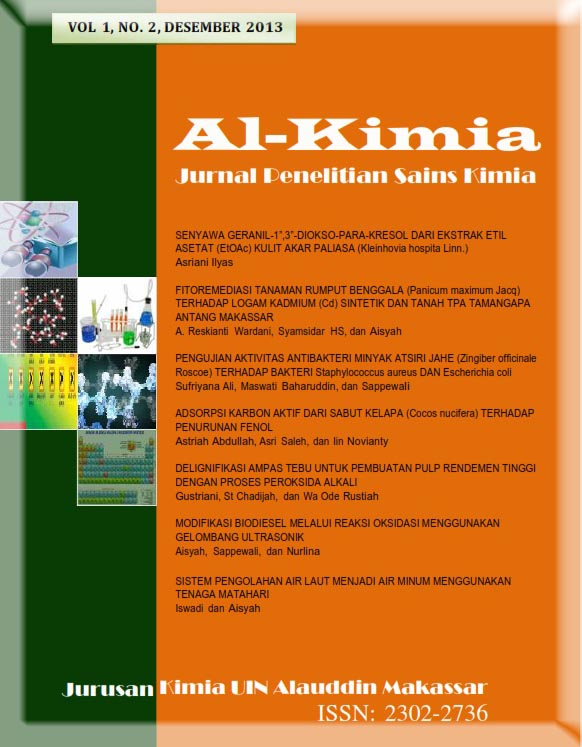Pengujian Aktivitas Antibakteri Minyak Atsiri Jahe (Zingiber Officinale Roscoe) Terhadap Bakteri Staphylococcus Aureus dan Escherichia Coli
Abstract
Testing the antibacterial activity of the Essential Oil of Ginger (Zingiber officinale Roscoe) against bacteria Staphylococcus aureus and Escherichia coli. Purpose of this study is to determine the bacterial growht and activity test active compounds in ginger essential oils that can be used as an antibacterial to inhibit the growth of bacteria. This research uses a method soxhletation with solvent n- hexane to obtain the essential oil of ginger, making the media NA, rejuvenation bacteria, the manufacture of bacterial inoculum and suspension test. Antibacterial activity test using paper disc diffusion method in the form and method of dilution and analysis using GC-MS instrument. Antibacterial activity test result using paper disc method with a concentration of 25%, 50%, 75% and 100% in S. aureus (12, 34; 19, 42; 17, 34; 21, 7) mm and E. coli (10, 56; 13, 76; 16, 5; 23, 6) mm, while the result of the minimum inhibitory concentration (MIC) using ginger essential oil dilution method in S. aureus not found and E. coli at a concentration of 100%. The results of the analysis of essential oil components by GC-MS showed the active compounds in the form of compounds containing hydroxyl groups such as nerol, β- eusdesmol, borneol and compounds containing phenolic groups like zingerone.Downloads
References
Gholib, D., 2008, Uji Daya Hambat Ekstrak Etanol Jahe Merah (Zingiber officinale Var. Rubrum) dan Jahe Putih (Zingiber officinale Var. Amarum) Terhadap Trchophyton mentagrophytes dan Cryptococcus neoformans, Seminar Nasional Teknologi Peternakan dan Veteriner, h. 827-830.
Hamid, A. A., et. al.., 2012, Efek Ekstrak Jahe (Zingiber officinale) Terhadap Pertumbuhan Methicilin Resistant Staphylococcus aureus In Vitro, Tugas Tkhir, Fakultas Kedokteran Universitas Brawijaya, h:1-8.
Hapsoh, Y. H. dan Elisa, J., 2008, Budidaya dan Teknologi Pascapanen Jahe. Medan : USU Press.
Hernani dan Christina Winarti, 2002, Kandungan Bahan Aktif Jahe dan Pemanfaatannya dalam Bidang Kesehatan, Status Teknologi Hasil Penelitian Jahe, Balai Besar Penelitian dan Pengembangan Pascapanen Pertanian, Bogor, h: 125-137.
Sari, K., et. al.., 2013, Uji Antimikroba Ekstrak Segar Jahe-jahean (Zingiberaceae) terhadap Staphylococcus aureus, Escherichi coli dan Candida albicans, Jurnal Biologi Universitas Andalas, 2 (1) : h. 20-24.
Authors who publish with this journal agree to the following terms:
1) Authors retain copyright and grant the journal right of first publication with the work simultaneously licensed under a Creative Commons Attribution License that allows others to share the work with an acknowledgement of the work's authorship and initial publication in this journal.
2) Authors are able to enter into separate, additional contractual arrangements for the non-exclusive distribution of the journal's published version of the work (e.g., post it to an institutional repository or publish it in a book), with an acknowledgement of its initial publication in this journal.
3)Authors are permitted and encouraged to post their work online (e.g., in institutional repositories or on their website) prior to and during the submission process, as it can lead to productive exchanges, as well as earlier and greater citation of published work (See The Effect of Open Access).


